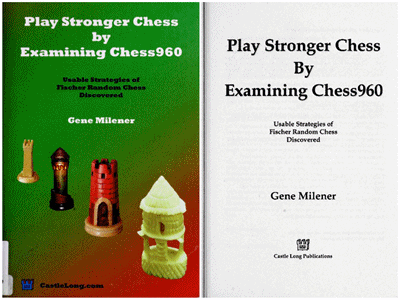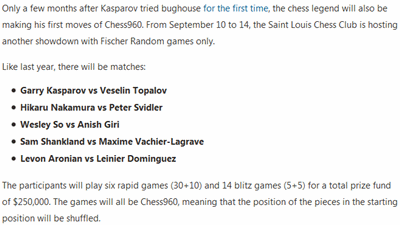In one of last month's posts,
Chess960 at the Open Library,
I discovered a digital copy of 'Play Stronger Chess by Examining Chess960' by Gene Milener. Since then, I've been slowly making my way through the book. As I wrote in the 'Open Library' post,
The book is not an easy read. It introduces new terminology, new notation, and many new ideas that challenge traditional chess thinking.
Having spent more time with it, I'm now more comfortable with the new terminology and new notation (although I still hesitate when I encounter the word 'plair'). I won't pretend to review the book. I've corresponded with Gene Milener on several occasions and he has left numerous comments on this blog as 'GeneM'. There are a few details concerning chess960 where we don't agree. Since these might easily intrude into any review, I'll just say that further comments are my opinion in 2018 versus GeneM's opinion in 2006.

The book is divided into two main parts:-
PART 1: Beyond the Board
PART 2: New Chess Principles Discovered
The 'Open Library' post separated these parts into chapters and for this current post I concentrated on the chapters in part 1. Five of the six chapters in that part discuss technical aspects of chess960, like the numbering system and PGN/FEN, but chapter two examines the relationship with traditional chess. The chapter opens with an anecdote. It had already made an impression on me when I read it at some time in the past, although I had forgotten its source.
I was reviewing a chess game from the
pages of John Nunn's superb book Understanding Chess Move By
Move. I feel like a spectator when I review or replay a chess
game, in the same way I feel like a spectator when I watch
football. It was the Jan Timman - Judit Polgar game (Sigeman
& Co., at Malmo 2000) in which Polgar carried an initiative
through most of the opening even though Timman's moves all
seemed solid and safe, even conservative (*). I felt like Polgar's
aggressive moves were more than interesting, they were
aesthetically pleasing and even inspiring. Chess is indeed
a melding of war and beauty.
Then I peeked inside my one modest and aging CD
of chess games, which contains about 800,000 games. This led to a
feeling of deflation and almost betrayal. For I saw that the exact
moves Polgar played through the opening have been played in
numerous other games too. Suddenly I felt like Polgar's play
had a diminished value, like that of a Picasso print as compared
to a Picasso original. At that moment chess960 popped back
into my head. Starting from that day I spent my evenings
researching chess960, though at first I had no inkling this would
lead me to write a book.
That is exactly what Bobby Fischer was talking about in remarks I quoted in
Fischer: 'The *Old* Chess Is Dead'
(February 2010). Fischer was speaking in January 2002:-
Q: Do you follow chess at all? A: I follow the old chess, I follow all the pre-arranged matches, like the last Kramnik - Kasparov match [October 2000]. At the highest level it is all pre-arranged, move by move. You have very interesting, beautiful pre-arranged games being created by very intelligent players, working with computers, working in teams. I have no objections to people creating such games, but they must say these are pre-arranged games, but they must not claim that they are finding the moves over the board. I have learned so much from these pre-arranged matches and all these cooked-up notes, they're wonderful. But they are fake, they are flawed.
The rest of Milener's chapter two goes on to discuss aspects of chess960 that are just as relevant today as they were in 2006. Here is a list of the chapter's section titles, where comments in brackets ('[]') are mine:-
2. The Tyranny of Tradition
- Opening Repetition Data
- The Greatest Spectator Sport on Earth?
- Bobby Fischer's Perspective on FRC/Chess960
- Learning from the Checkers Example
- Impedance to Rejoining the USCF
- Befuddled by Time Data
- An Optimistic Perspective on Chess960
- Center of the Universe for FRC/Chess960 [Mainz]
- What are Chess, Chess1, and Chess960
- First In Wins ['First-In']
- Opening Theme Tournaments
The section titled 'Optimistic Perspective' is particularly relevant. Bobby Fischer was alive at the time the book was published. I wonder what he thought about it. Was he also optimistic about the adoption of his invention?
(*)
Jan Timman vs Judit Polgar; Sigeman & Co (2000), Malmo SWE
(chessgames.com).


